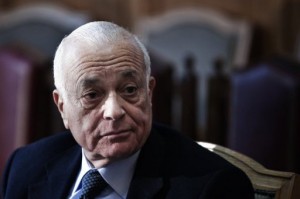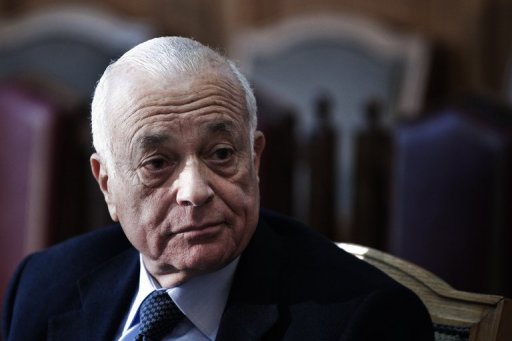
(AFP Photo)
Arab League Secretary General Nabil El-Araby said the decision to focus on Arab national security is the most important outcome of the Arab League summit in Sharm El-Sheikh on Sunday.
He added that the principal of establishing an Arab military force was a “dream”, however joining the Arab force is “optional”.
Regional leaders concluded the Arab League’s 26th session with a preliminary agreement to establish a military force. This will fall under the supervision of a high-level team of Chiefs-of-Staff from the region’s armed forces.
President Abdel Fattah Al-Sisi made the announcement at the closing session of the Arab League Summit held in Sharm Al-Sheikh.
El-Araby said in a press conference following the summit, that for the first time, Arab nations have decided to face “the unprecedented threats” through forming joint military force from countries “who wish to join”.
He added that the calls for the meetings of the Chiefs-of-Staff will take place within a month.
However, Arab national security is not only limited to the formation of a regional military force, but also includes a stable economic situation in Arab nations, El-Araby said.
Saudi Arabia, backed by Gulf Cooperation Council (GCC) countries, launched airstrikes last week against Yemeni capital Sana’a, which is currently under control of the Houthi Shi’a group.
The concluding statement of the Arab League session noted the continuation of military intervention in Yemen, which was called for by Yemini President Abdrabbuh Mansour Hadi on Saturday. He said this would occur until the Houthis “back off, hand in their weapons and return legitimacy” to Hadi.
Egypt announced its “political and military” support to Saudi Arabia against Houthis following the airstrikes.
Also in the statement, the situation in Syria and Libya was addressed, with Arabs stressing the need to combat “terrorist organisations”. It also added the importance of Arab solidarity “in word and act” in dealing with the current developments facing the region. It called upon the international community to support Arab efforts to combat terrorism and stop its funding.
The situation in Libya and Syria among other Arab Nations has been deteriorating since the revolutions of the Arab Spring swept the region and the spread of Islamist groups and Islamic State and their affiliates.
The Arab stance towards the Palestinian cause was reiterated, with other Arab nations saying they will continue to back the Palestinians until their rights are regained.
Arabs agreed to rid the Middle East from nuclear weapons and weapons of mass destruction. The importance of Israel’s joining of the Non-Proliferation Treaty (NPT) agreement was emphasised, alongside placing comprehensive safeguards around all nuclear facilities in the Middle East, including Iran. The safeguards would be outlined by the International Atomic Energy Agency (IAEA).
It also called for the coordination of efforts to counterterrorism through the exchange of security information and intelligence judicial cooperation and military coordination.
